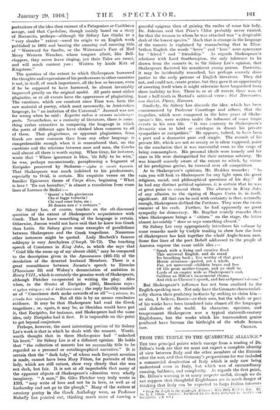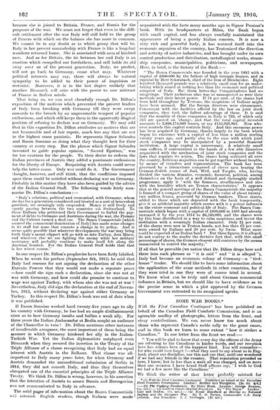FROM THE TRIPLE TO THE QUADRUPLE ALLIANCE.*
TuE two principal points which emerge from a reading of Dr. Dillon's book are that we must not expect a complete identity of view between Italy and the other members of the Entente after the war, and that Germany's preparations for war included a commercial domination of Italy which is only now being understood even in Italy, but which was of extraordinary cunning, boldness, and complexity. As regards the first point, Dr. Dillon's warning is in many respects useful, though we do net suppose that thoughtful Englishmen are in much danger of thinking that Italy can be expected to forgo Italian interests • From the Triple to Ike Quodraple AllEvare Why Italy Writ ti War. By
Dr. E. J. Dillon. London : Published for the DaVg Xeleitiph liuidn and litoaghten. 1:s. net.'
because she is joined to Britain, France, and Russia for the purposes of the war. We must not forget that even in the diffi- cult settlement after the war Italy will still hold to the group of Powers with which on the balance she has more in common. We cannot be in any doubt as to which group that will be.
Italy in her present comradeship with France is like a long-last wanderer returned home. She is associated with men of kindred race. And as for Britain, the tie between her and Italy is an emotion which compelled our forefathers, and still holds its old sway over us of the present generation. Italy, we predict, will not go back to Germany, come what may. Whatever political interests may say, there will always be natural sympathy to be added to their power of impulsion or restraint. Moreover, it is in the last degree unlikely that another Bismarck will arise with the power to sow mistrust of France in Italian minds.
That being so, we can read cheerfully enough Dr. Dillon's exposition of the motives which prevented the present leaders of Italy from breaking with Germany till they were swept onwards to the breach by an ungovernable tempest of popular enthusiasm, and which still keeps them in the apparently illogical position of refusing to declare war on Germany. We may add that in this exposition Dr. Dillon attributes no motives that are not honourable and of fair repute, much less any that are not in the highest sense patriotic. He represents Signor Salandra and Baron Sonnino as doing what they thought best for their country at every step. But the phrase which Signor Salandra invented to guide popular opinion, " Sacred Egotism," was far too cautious for the people. To their desire to redeem the Italian provinces of Austria they added a passionate enthusiasm for the liberty of Europe. Bargaining with Austria could never help the latter cause. Only war could do it. The Government thought, however, and still think, that the conditions imposed
upon them could be satisfied without declaring war on Germany. Probably in this matter they have also been guided by the advice of the Italian General Staff. The following words fairly sum- marize Dr. Dillon's conclusions :— " Italy's relations, politica! and economical, with Germany, whom she has for a generation considered and treated as a sort of benevolent guardian, arc seemingly only suspended. Money is still freely and openly passing between the two countries via Switzerland. To those Italians who petitioned their Government to forbid the pay- ment of debts to Germans and Austrians during the war, the Premier and tho Cabinet turned a deaf ear. The Banca Commerciale [which secured the commercial domination of Italy] has made some changes in its staff but none that connote a change in its policy. And it seems quite possible that whatever developments the war may bring forth Italy's moral sapport will go with us into Turkey, Asia Minor, and wherever else we are fighting the enemy while her military assistance. will probably continue to make itself felt along the Austrian frontier. For the Italian General Staff holds that that is her wisest course."
In one respect Dr. Dillon's prophecies have been flatly falsified.
When he wrote his preface (September 6th, 1915) he said that Italy had reasons for not signing the declaration of the other Entente Powers that they would not make a separate peace —how could she sign such a declaration, since she was not at war with Germany, and how could she promise to continue to wage war against Turkey, with whom also she was not at war ? Nevertheless, Italy did sign the declaration at the end of Novem- ber, 1915, without declaring war against either Germany or Turkey. In this respect Dr. Dillon's book was out of date when it was published.
If Baron Sonnino worked hard twenty-five years ago to ally his country with Germany, he has had an ample disillusionment since as to how Germany insults and bullies a weak ally. For three years the Italian .Ambassador at Berlin sought an audience of the Chancellor in vain ! Dr. Dillon mentions other instances of insufferable arrogance, the most important-of them being the manner in which Germany hindered her ally in the Italian- Turkish War. Yet the Italian diplomatists outplayed even Bismarck when they secured the insertion in the Treaty of the Triple Alliance of a clause recognizing that Italy had an equal interest with Austria in the Balkans. That clause was all- important to Italy many years later, for when Germany and Austria demanded the unconditional submission of Serbia in 1914, they did not consult Italy, and thus they themselves abrogated one of the essential principles of the Triple Alliance Treaty. We think Dr. Dillon is wrong, however, in his assertion that the intention of Austria to annex Bosnia and Herzegovina was not communicated to Italy in advance.
The solid pages of information about the Banca Commerciale will astonish English readers, though Italians were made acquainted with the facts many months ago in Signor Preziosi's book. With its headquarters at Milan, the Bank began with small capital, and has always carefully maintained the appearance of being a purely Italian concern. It is now a very rich and powerful body, it has wormed itself into the economic organism of the country, has Teutonized the direction and activity of native industries, and has brought under its own control production and distribution, metallurgical works, steam- ship companies, municipalities, politicians, and newspapers. Here, in brief, is the history of the Bank :-
" The Banes Commerciale was founded in the year 1895 with a capital of £800,000 by the fathers of high German finance, and in especial by Herr Schwabach, chief of the firm of Bleichrikler. Eight hundred thousand pounds was a relatively small sum for an under- taking which aimed at nothing less than the economic and political conquest of Italy. But those latter-day Conquistadores had no- misgivings. Their audacious plan was as unsuspected as were their methods and their latent power. If 74 par cent. of the shares had been held throughout by Teutons, the suspicions of Italians might have been aroused. But the foreign directors were circumspect. Conversant with the facilities offered by the law on joint stock companies, they took the fullest advantage of these. It is said that the number of those companies in Italy is 793, of which only 245 are quoted- on 'change, and that the total capital invested amounts to 3,898,174,049 francs, or say £155,926,961. Now who- ever controls this capital controls Italy. And this enormous power has bean acquired by Germany, thanks largely to the bank which began its existence with a capital of less than a million sterling twenty years ago, and partly also to the ease with which joint stock companies may be manipulated by a powerful financial' institution. A large capital is unnecessary. A relatively small sum suffices, if concentrated in the hands of a few able financiers acquainted with the mechanism of joint stock companies and the laws that regulate its action. The shares being scattered all over the country, fictitious majorities can be got together without trouble, by means of transfers and representation. The bank has been governed by a triumvirate composed of clever men bearing the German-Jewish names of Joel, Weil, and Toepliz, who, having divided the various domains, economic, financial, political, among themselves on the basis of a well defined and thoroughly studied programme, apply it ' with the firmness, steadfastness and also with the brutality which are Teuton characteristics.' It appears that at the general meetings of the Banca Commerciale the majority is formed of a compact group of shares of the value of about twenty- two million francs, possessed by German bankers. These shares, added to those which are deposited with the bank temporarily. give it an artificial majority which carries with it a potent influence on the entire economic and political life of Italy.. The Banca Com- merciale which began with a capital of £800,000 in 1895 had already increased it by the year 1914 to £6,240,000, and the shares were by this time distributed in a way to calm suspicions and invest the institution with a seemingly Italian character. Only 2i per cont. of the shares were now in Teuton hands, not less than (13 per cent. were owned by Italians and 20 per cent. by Swiss. What more could be expected of an Italian bank ? But these figures, it is alleged, do not convey to the reader the decisive fact that, with this small • percentage of shares, the German element still contrives by the means. enumerated to control the majority."
If all that be provable (we notice that Dr. Dillon drops here and there into such phrases as " it is said " and " it is alleged ".), Italy had become an economic colony of Germany—a " tied-. house " trader. We should like to have some information about the application of the same methods in other countries, for if they were tried in one they were of course tried in several. We know what can be truly said about German commercial influence in Britain, but we should like to have evidence as to the precise sense in which a plot approved by the German Government was entrusted to its recognized agents.



















































 Previous page
Previous page